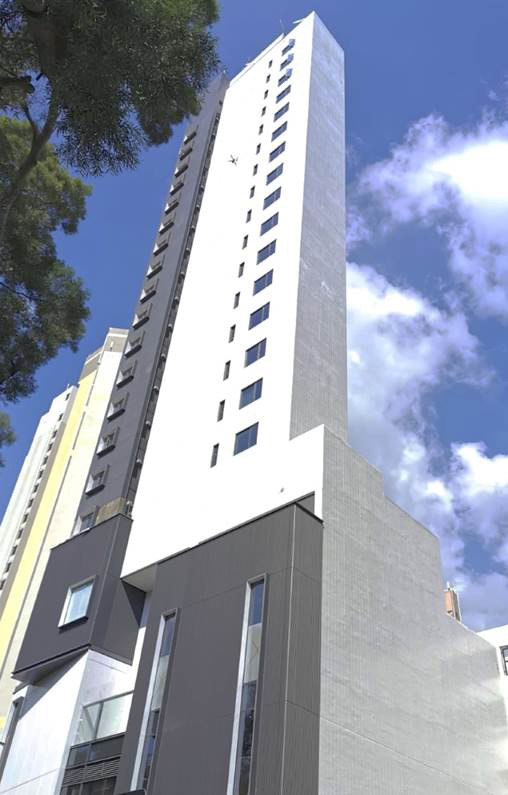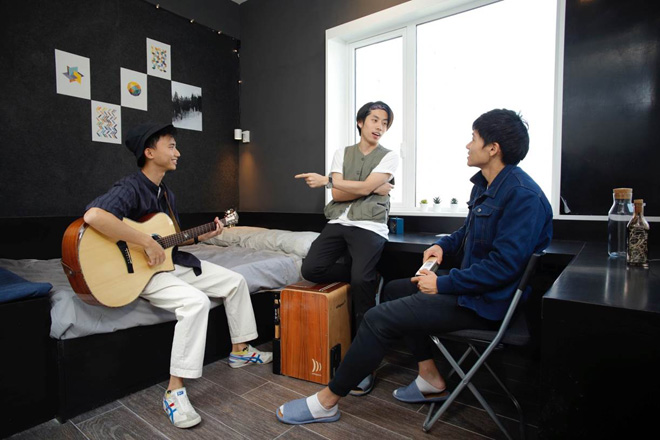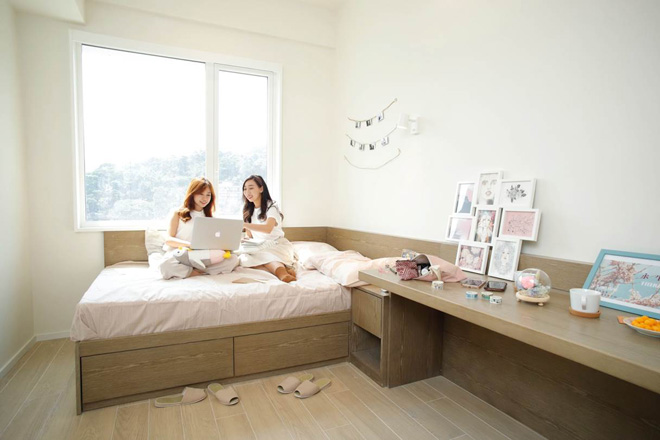Optimise land use, multi-pronged approach to better meet public needs
5 January 2020

|

|
The Government has been rendering support for non-governmental organisations (NGOs) to take forward the Youth Hostel Scheme (YHS) by making optimal use of private land resources to provide working youths with brand-new, no-frills and independent living space at affordable rent, thereby attaining the goal of promoting their upward mobility.
Located in Tai Po, the city’s first YHS project, which is built and operated by the Hong Kong Federation of Youth Groups (HKFYG), will be completed soon, providing 80 places in total. The project was met with an overwhelming response as HKFYG received some 900 applications during the application period between 16 December 2019 and 4 January 2020. The computer ballot results will be released online the day after tomorrow (7 January 2020). Selected applicants are required to attend an interview. Upon eligibility verification and screening, the first batch of tenants are expected to move in this March at the earliest.
It is not at all easy for our young people to have their own living space. Although the first youth hostel offers only a limited number of units, we are actively taking forward the other six YHS projects in partnership with NGOs to provide about 3 300 more places.
Among them, the project undertaken by the Po Leung Kuk at Ma Tin Pok, Yuen Long, which will provide 1 680 hostel places (the largest number under the YHS), is expected to complete by the third quarter of next year (2021). Besides, funding approvals have been secured for the detailed design of the projects by the Tung Wah Group of Hospitals in Sheung Wan and the Hong Kong Girl Guides Association in Jordan, and the related work is now in full gear. For the project by the Hong Kong Association of Youth Development in Mong Kok, the technical feasibility study has been approved and pre-construction works will commence in due course. Meanwhile, the project by the Hong Kong Sheng Kung Hui in Yuen Long has reached the final phase of its pre-construction consultancy studies. For the Salvation Army’s project in Wan Chai, pre-construction consultancy studies will be underway this year.
In the meantime, the Chief Executive has announced in her 2019 Policy Address that the requirement of the YHS would be relaxed to allow YHS tenants to submit/retain their applications for public rental housing (PRH) and continue to accumulate points under the Quota and Points System.
The Government will keep in view the demand for youth hostels and continue to liaise with interested NGOs in order to provide more places.
The YHS is only a drop in the bucket and far from enough to meet the housing needs of young people. In fact, it aims to provide working youths with transitional support only, while a substantial increase in public and private housing supply is the ultimate solution to the problem. However, Hong Kong is facing an acute shortage of land supply. We must continue to adopt a multi-pronged approach to increase public housing supply in the short, medium and long term to meet the strong housing demand of the public.

|

|
Since it takes time to secure land for housing development, a rather long time will be needed for the supply of public and private housing to fully meet its demand. In view of this, the Government actively supports and facilitates the implementation of various short-term initiatives put forward and carried out by community organisations to substantially increase the number of transitional housing projects, so as to relieve the pressure of families living in unpleasant conditions and those having waited for PRH for a long time.
The 2019 Policy Address announced a substantial increase in the number of transitional housing projects to provide a total of 10 000 such units within the next three years. Thanks to cross-sector collaboration, up to the end of December 2019, we have announced in phases the provision of over 8 000 units. The number included 6 000 units which were announced earlier and 2 000 units to be built by adopting the Modular Integrated Construction method on land provided by a developer to community organisations at a nominal rent as announced last week (30 December). The latter is expected to benefit more than 6 000 families or 2 million persons.
On financing, the Government has sought the endorsement of the Panel on Housing of the Legislative Council (LegCo) for setting up a $5 billion funding scheme to support the works expenses of transitional housing projects. We will seek funding approval from the LegCo Finance Committee as soon as possible.
Meanwhile, the Task Force on Transitional Housing is continuing its feasibility study on the provision of transitional estates on idle government and private land, and has obtained backing from professional construction organisations (including the Hong Kong Construction Association, the Urban Renewal Authority and the Hong Kong Housing Society) to provide professional advice and project management support to the proposing community organisations. The commissioned organisations will announce the details in due course.
Faced with the problem of building ageing, the Government attaches great importance to the maintenance and repair of old buildings. Although it is the primary responsibility of owners to timely and properly maintain and repair their buildings, the Government recognises that the lack of financial means or technical knowledge has made it difficult for some owners to fulfil their responsibility.
In this connection, the Government announced in October 2019 the injection of an additional $10.5 billion to enhance the four existing building rehabilitation subsidy schemes. Progress has been made gradually. The injection includes an additional funding of $3 billion for Operation Building Bright 2.0, under which the number of buildings to benefit is expected to increase from 2 500 to 5 000; an additional funding of $3.5 billion for the Fire Safety Improvement Works Subsidy Scheme, under which the number of buildings to benefit is expected to increase from 2 000 to 5 500; an additional funding of $2 billion for the Lift Modernisation Subsidy Scheme, under which the number of lifts to be modernised is expected to increase from 5 000 to 8 000; and additional funding of $2 billion for the Building Maintenance Grant Scheme for Elderly Owners with the maximum grant increased from the existing $40,000 to $80,000 and around 25 000 owners are expected to benefit.
We hope that the additional resources can help more needy owners improve their living environment, uphold building safety and eliminate safety hazards for the public.
Insufficient land and tight housing supply have been a long-standing and deep-seated problem in Hong Kong. The current-term Government will address this problem using a multi-pronged approach. Despite the challenges encountered during the process, I believe that, given our determination, a community-government-business partnership and full community support, there are always more solutions than problems.

